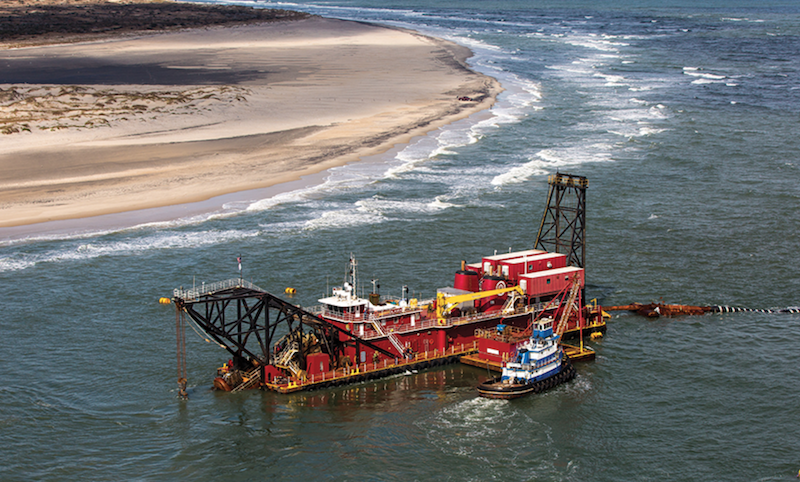With the recent boost in federal infrastructure spending on ports and waterways, an increase in dredging work is expected. Historically, contracts with the Army Corps of Engineers are brought in the U.S. Court of Federal Claims, which hears disputes arising from federal contracts.
After over 150 years of the Court of Federal Claims exercising jurisdiction over government dredging contract disputes, the U.S. Court of Appeals for the First Circuit analyzed whether such contracts actually fall within a federal district court’s admiralty jurisdiction. Finding that dredging a navigable waterway protects and facilitates maritime commerce, in J-Way Southern v. U.S. Army Corps of Engineers, the First Circuit held that a federal district court has jurisdiction over federal dredging contract disputes. This decision provides an avenue for dredging contractors to choose a federal court that is potentially more convenient or favorable for disputes with the Corps of Engineers.
J-Way Southern won a contract to perform dredging operations for the Corps. However, the Corps terminated the contract claiming J-Way’s performance was deficient because J-Way did not complete the work within the timeframe set in the contract. J-Way filed suit, alleging improper termination and breach of the contract by the Corps. In response, the Corps argued J-Way’s case was time-barred under the Contract Disputes Act (CDA). The Corps also filed a motion to dismiss based on lack of subject matter jurisdiction, arguing that only the Court of Federal Claims had jurisdiction over a dispute based on a federal dredging contract. The district court denied the motion.
On appeal, the First Circuit found that it had jurisdiction to decide the case because the dredging contract forming the basis of the suit was a maritime contract. The Corps’ argument against the district court’s exercise of jurisdiction rested on the historical practice, dating back to 1857, of the Court of Federal Claims hearing government dredging contract disputes. However, as the court noted, no court had ever actually analyzed whether the Court of Federal Claims had jurisdiction in a case such as this.
While generally the Court of Federal Claims has exclusive jurisdiction over contract claims against the U.S. in excess of $10,000, the CDA vests admiralty jurisdiction in the federal district courts for lawsuits against the U.S. that arise out of maritime contracts. Thus, jurisdiction rested upon a finding that a dredging contract meets the test for maritime contracts.
Whether a contract is maritime depends upon whether the contract “has reference to maritime service or maritime transactions.” The court’s inquiry focuses “on whether the principal objective of a contract is maritime commerce.” The answer depends on the “nature and character” of the contract rather than the location, land vs. water, of the services performed.
The court agreed with J-Way that “[d]redging a navigable waterway is traditionally a maritime activity, and such a dredging contract facilitates maritime commerce.”
The regulatory definition of “dredging,” on which the Corps relied, referred to dredging as a type of construction, thus the Corps asserted the “principal objective” of the contract was construction rather than maritime commerce. However, the court found the regulatory definition did not determine the jurisdictional question where the “principal objective” of the construction was to aid maritime commerce. Nor was the court persuaded by the fact that substantial portions of the contract’s work were performed on land.
The Corps ultimately offered no legal support to explain why these considerations should outweigh the contract’s plain language and compensation scheme. Rather, the Corps paid J-Way based on the amount of sediment dredged and all land-based activities were merely incidental to accomplishing the main goal of dredging the navigable channel.
The dredging contract between J-Way and the Corps had a “genuinely salty flavor.” Maritime services formed the base of the contract’s nature. Therefore, the First Circuit held that the federal district court had jurisdiction over the dredging contract dispute. While the dredging contractor won the maritime jurisdiction issue, it was ultimately unsuccessful on the merits.
It remains to be seen whether other circuit courts will follow the First Circuit and assert admiralty jurisdiction over dredging contracts with the Corps.




